Brain Biology: Investigating Cognitive and Perpetual Processes in Living Brains
VerifiedAdded on 2023/06/15
|8
|1900
|379
AI Summary
This paper reviews brain lesion examinations underlying the making, storage, retrieval and loss of memories. Approaches include Transcranial Magnetic Stimulation (TMS), functional magnetic resonance imaging (fMRI), electrical stimulation of the brain (ESB), and cytotoxic chemicals.
Contribute Materials
Your contribution can guide someone’s learning journey. Share your
documents today.

Running Head: BRAIN BIOLOGY 1
Brain Biology
Name:
Institution:
Brain Biology
Name:
Institution:
Secure Best Marks with AI Grader
Need help grading? Try our AI Grader for instant feedback on your assignments.
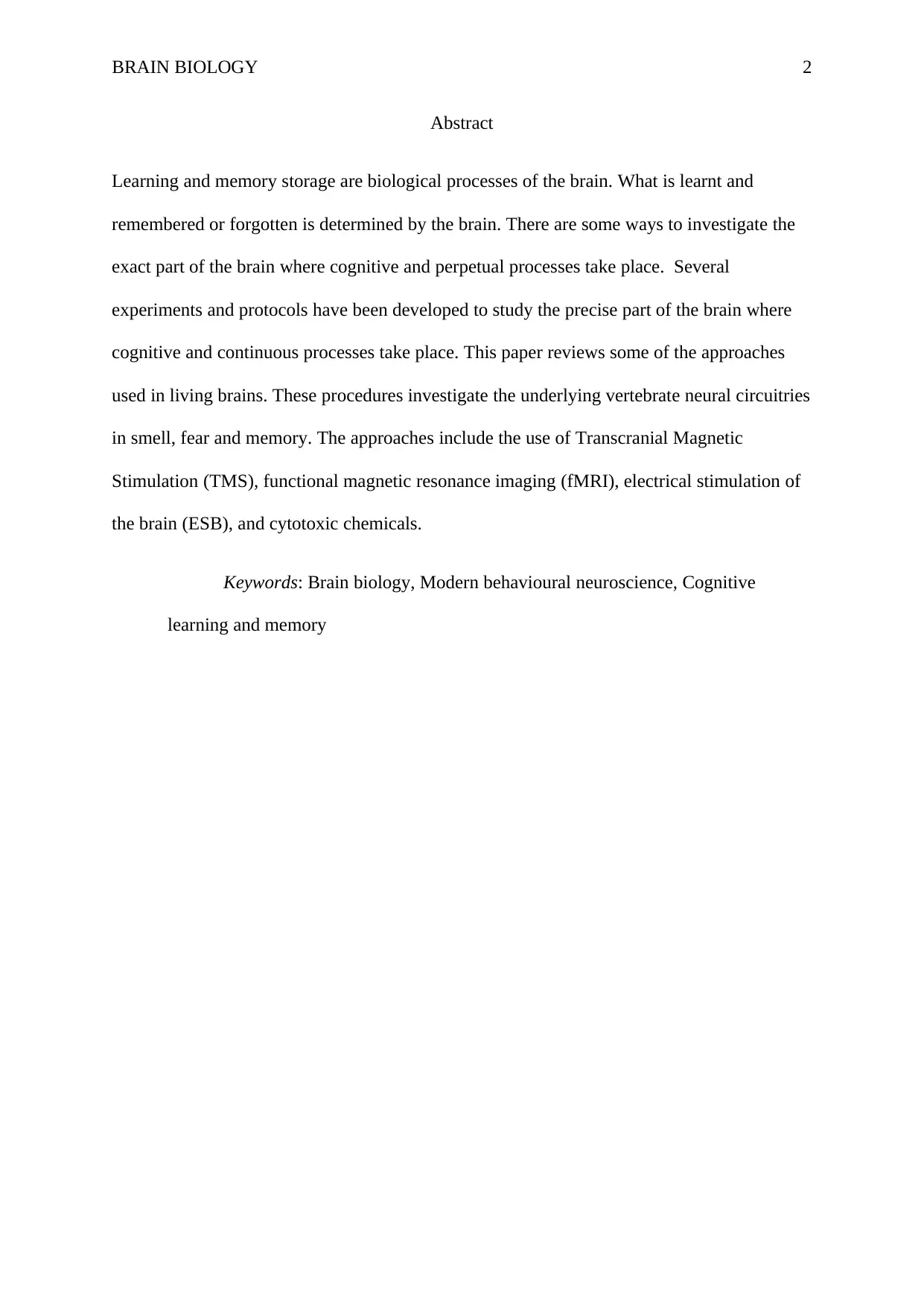
BRAIN BIOLOGY 2
Abstract
Learning and memory storage are biological processes of the brain. What is learnt and
remembered or forgotten is determined by the brain. There are some ways to investigate the
exact part of the brain where cognitive and perpetual processes take place. Several
experiments and protocols have been developed to study the precise part of the brain where
cognitive and continuous processes take place. This paper reviews some of the approaches
used in living brains. These procedures investigate the underlying vertebrate neural circuitries
in smell, fear and memory. The approaches include the use of Transcranial Magnetic
Stimulation (TMS), functional magnetic resonance imaging (fMRI), electrical stimulation of
the brain (ESB), and cytotoxic chemicals.
Keywords: Brain biology, Modern behavioural neuroscience, Cognitive
learning and memory
Abstract
Learning and memory storage are biological processes of the brain. What is learnt and
remembered or forgotten is determined by the brain. There are some ways to investigate the
exact part of the brain where cognitive and perpetual processes take place. Several
experiments and protocols have been developed to study the precise part of the brain where
cognitive and continuous processes take place. This paper reviews some of the approaches
used in living brains. These procedures investigate the underlying vertebrate neural circuitries
in smell, fear and memory. The approaches include the use of Transcranial Magnetic
Stimulation (TMS), functional magnetic resonance imaging (fMRI), electrical stimulation of
the brain (ESB), and cytotoxic chemicals.
Keywords: Brain biology, Modern behavioural neuroscience, Cognitive
learning and memory
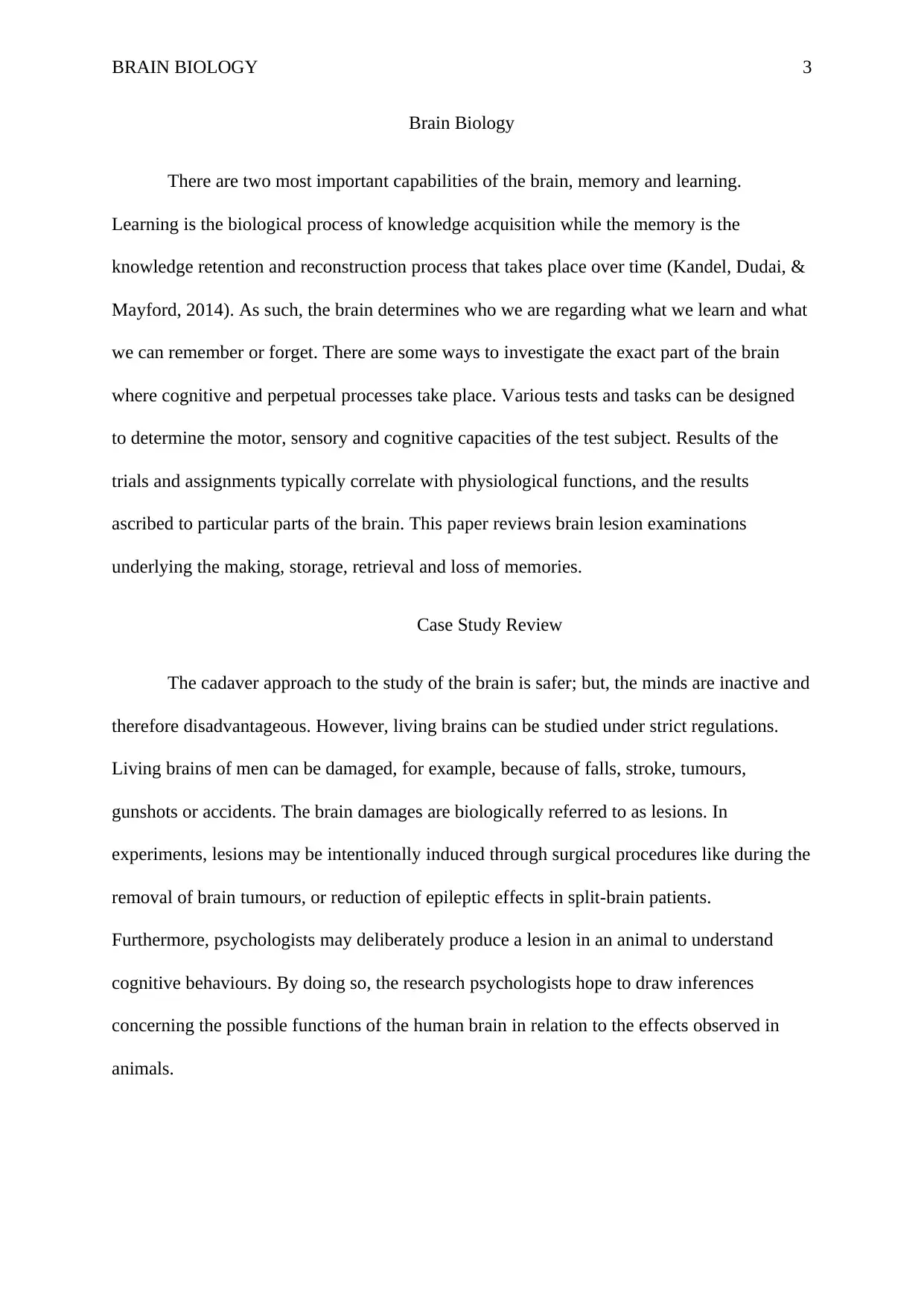
BRAIN BIOLOGY 3
Brain Biology
There are two most important capabilities of the brain, memory and learning.
Learning is the biological process of knowledge acquisition while the memory is the
knowledge retention and reconstruction process that takes place over time (Kandel, Dudai, &
Mayford, 2014). As such, the brain determines who we are regarding what we learn and what
we can remember or forget. There are some ways to investigate the exact part of the brain
where cognitive and perpetual processes take place. Various tests and tasks can be designed
to determine the motor, sensory and cognitive capacities of the test subject. Results of the
trials and assignments typically correlate with physiological functions, and the results
ascribed to particular parts of the brain. This paper reviews brain lesion examinations
underlying the making, storage, retrieval and loss of memories.
Case Study Review
The cadaver approach to the study of the brain is safer; but, the minds are inactive and
therefore disadvantageous. However, living brains can be studied under strict regulations.
Living brains of men can be damaged, for example, because of falls, stroke, tumours,
gunshots or accidents. The brain damages are biologically referred to as lesions. In
experiments, lesions may be intentionally induced through surgical procedures like during the
removal of brain tumours, or reduction of epileptic effects in split-brain patients.
Furthermore, psychologists may deliberately produce a lesion in an animal to understand
cognitive behaviours. By doing so, the research psychologists hope to draw inferences
concerning the possible functions of the human brain in relation to the effects observed in
animals.
Brain Biology
There are two most important capabilities of the brain, memory and learning.
Learning is the biological process of knowledge acquisition while the memory is the
knowledge retention and reconstruction process that takes place over time (Kandel, Dudai, &
Mayford, 2014). As such, the brain determines who we are regarding what we learn and what
we can remember or forget. There are some ways to investigate the exact part of the brain
where cognitive and perpetual processes take place. Various tests and tasks can be designed
to determine the motor, sensory and cognitive capacities of the test subject. Results of the
trials and assignments typically correlate with physiological functions, and the results
ascribed to particular parts of the brain. This paper reviews brain lesion examinations
underlying the making, storage, retrieval and loss of memories.
Case Study Review
The cadaver approach to the study of the brain is safer; but, the minds are inactive and
therefore disadvantageous. However, living brains can be studied under strict regulations.
Living brains of men can be damaged, for example, because of falls, stroke, tumours,
gunshots or accidents. The brain damages are biologically referred to as lesions. In
experiments, lesions may be intentionally induced through surgical procedures like during the
removal of brain tumours, or reduction of epileptic effects in split-brain patients.
Furthermore, psychologists may deliberately produce a lesion in an animal to understand
cognitive behaviours. By doing so, the research psychologists hope to draw inferences
concerning the possible functions of the human brain in relation to the effects observed in
animals.
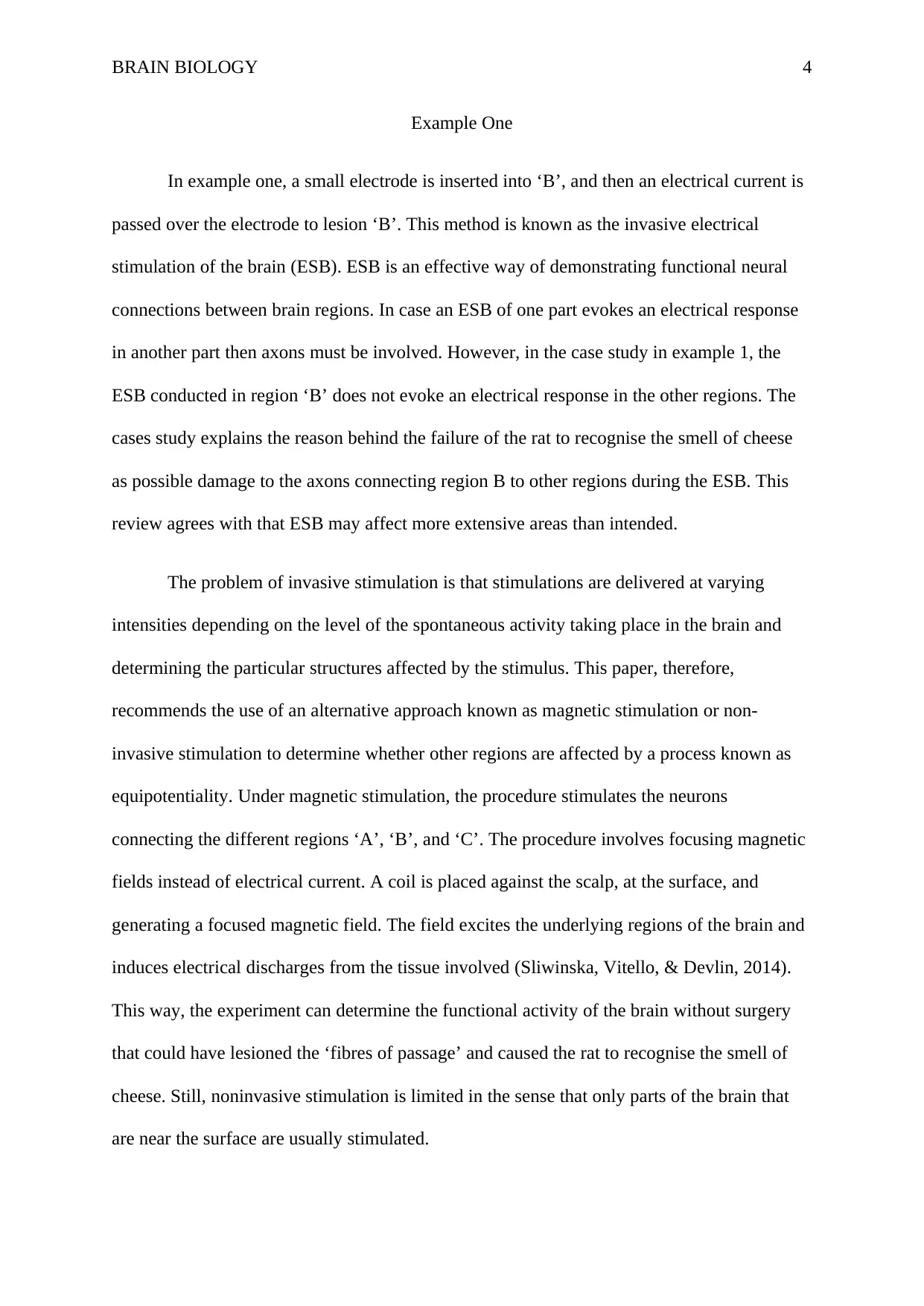
BRAIN BIOLOGY 4
Example One
In example one, a small electrode is inserted into ‘B’, and then an electrical current is
passed over the electrode to lesion ‘B’. This method is known as the invasive electrical
stimulation of the brain (ESB). ESB is an effective way of demonstrating functional neural
connections between brain regions. In case an ESB of one part evokes an electrical response
in another part then axons must be involved. However, in the case study in example 1, the
ESB conducted in region ‘B’ does not evoke an electrical response in the other regions. The
cases study explains the reason behind the failure of the rat to recognise the smell of cheese
as possible damage to the axons connecting region B to other regions during the ESB. This
review agrees with that ESB may affect more extensive areas than intended.
The problem of invasive stimulation is that stimulations are delivered at varying
intensities depending on the level of the spontaneous activity taking place in the brain and
determining the particular structures affected by the stimulus. This paper, therefore,
recommends the use of an alternative approach known as magnetic stimulation or non-
invasive stimulation to determine whether other regions are affected by a process known as
equipotentiality. Under magnetic stimulation, the procedure stimulates the neurons
connecting the different regions ‘A’, ‘B’, and ‘C’. The procedure involves focusing magnetic
fields instead of electrical current. A coil is placed against the scalp, at the surface, and
generating a focused magnetic field. The field excites the underlying regions of the brain and
induces electrical discharges from the tissue involved (Sliwinska, Vitello, & Devlin, 2014).
This way, the experiment can determine the functional activity of the brain without surgery
that could have lesioned the ‘fibres of passage’ and caused the rat to recognise the smell of
cheese. Still, noninvasive stimulation is limited in the sense that only parts of the brain that
are near the surface are usually stimulated.
Example One
In example one, a small electrode is inserted into ‘B’, and then an electrical current is
passed over the electrode to lesion ‘B’. This method is known as the invasive electrical
stimulation of the brain (ESB). ESB is an effective way of demonstrating functional neural
connections between brain regions. In case an ESB of one part evokes an electrical response
in another part then axons must be involved. However, in the case study in example 1, the
ESB conducted in region ‘B’ does not evoke an electrical response in the other regions. The
cases study explains the reason behind the failure of the rat to recognise the smell of cheese
as possible damage to the axons connecting region B to other regions during the ESB. This
review agrees with that ESB may affect more extensive areas than intended.
The problem of invasive stimulation is that stimulations are delivered at varying
intensities depending on the level of the spontaneous activity taking place in the brain and
determining the particular structures affected by the stimulus. This paper, therefore,
recommends the use of an alternative approach known as magnetic stimulation or non-
invasive stimulation to determine whether other regions are affected by a process known as
equipotentiality. Under magnetic stimulation, the procedure stimulates the neurons
connecting the different regions ‘A’, ‘B’, and ‘C’. The procedure involves focusing magnetic
fields instead of electrical current. A coil is placed against the scalp, at the surface, and
generating a focused magnetic field. The field excites the underlying regions of the brain and
induces electrical discharges from the tissue involved (Sliwinska, Vitello, & Devlin, 2014).
This way, the experiment can determine the functional activity of the brain without surgery
that could have lesioned the ‘fibres of passage’ and caused the rat to recognise the smell of
cheese. Still, noninvasive stimulation is limited in the sense that only parts of the brain that
are near the surface are usually stimulated.
Secure Best Marks with AI Grader
Need help grading? Try our AI Grader for instant feedback on your assignments.
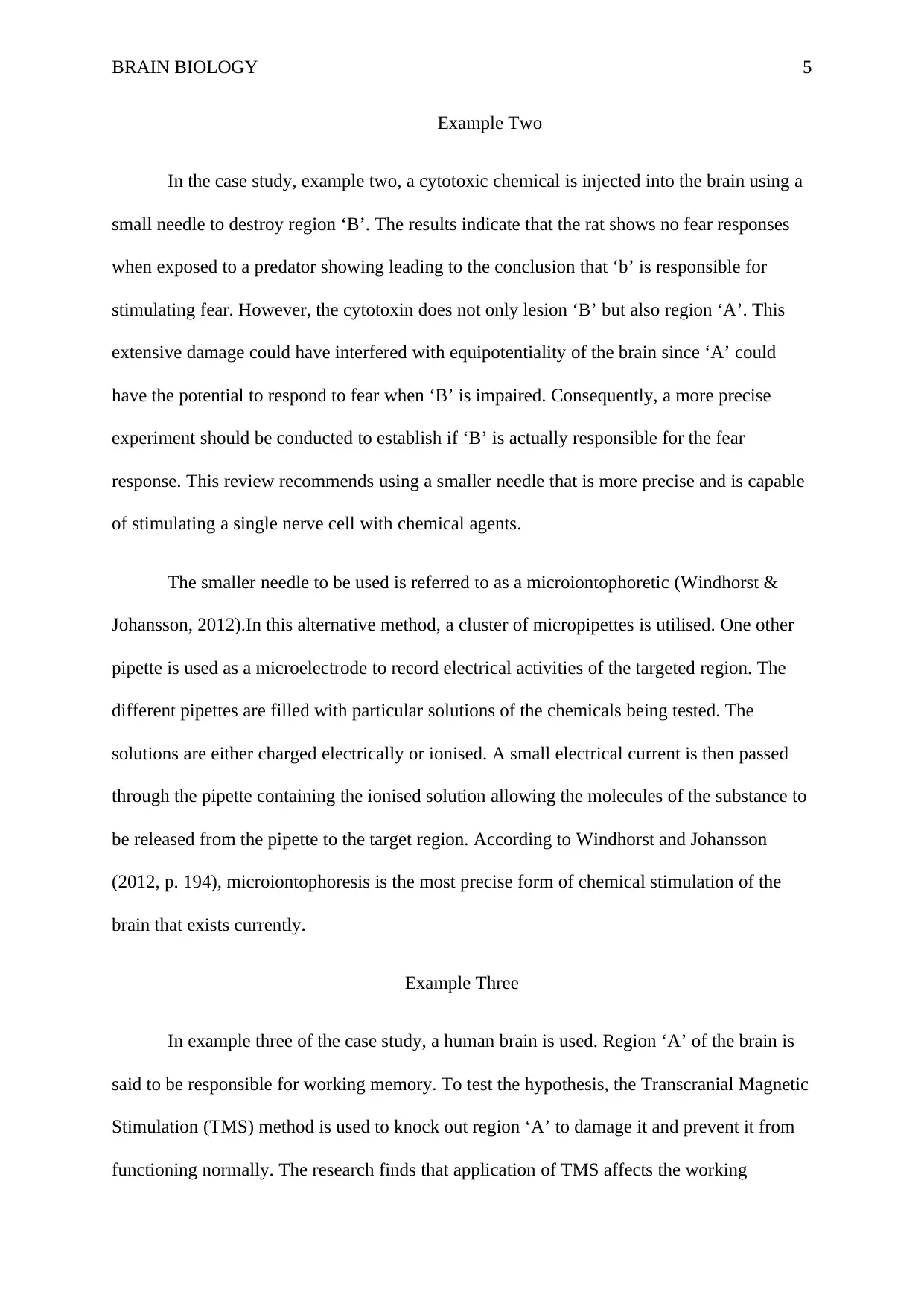
BRAIN BIOLOGY 5
Example Two
In the case study, example two, a cytotoxic chemical is injected into the brain using a
small needle to destroy region ‘B’. The results indicate that the rat shows no fear responses
when exposed to a predator showing leading to the conclusion that ‘b’ is responsible for
stimulating fear. However, the cytotoxin does not only lesion ‘B’ but also region ‘A’. This
extensive damage could have interfered with equipotentiality of the brain since ‘A’ could
have the potential to respond to fear when ‘B’ is impaired. Consequently, a more precise
experiment should be conducted to establish if ‘B’ is actually responsible for the fear
response. This review recommends using a smaller needle that is more precise and is capable
of stimulating a single nerve cell with chemical agents.
The smaller needle to be used is referred to as a microiontophoretic (Windhorst &
Johansson, 2012).In this alternative method, a cluster of micropipettes is utilised. One other
pipette is used as a microelectrode to record electrical activities of the targeted region. The
different pipettes are filled with particular solutions of the chemicals being tested. The
solutions are either charged electrically or ionised. A small electrical current is then passed
through the pipette containing the ionised solution allowing the molecules of the substance to
be released from the pipette to the target region. According to Windhorst and Johansson
(2012, p. 194), microiontophoresis is the most precise form of chemical stimulation of the
brain that exists currently.
Example Three
In example three of the case study, a human brain is used. Region ‘A’ of the brain is
said to be responsible for working memory. To test the hypothesis, the Transcranial Magnetic
Stimulation (TMS) method is used to knock out region ‘A’ to damage it and prevent it from
functioning normally. The research finds that application of TMS affects the working
Example Two
In the case study, example two, a cytotoxic chemical is injected into the brain using a
small needle to destroy region ‘B’. The results indicate that the rat shows no fear responses
when exposed to a predator showing leading to the conclusion that ‘b’ is responsible for
stimulating fear. However, the cytotoxin does not only lesion ‘B’ but also region ‘A’. This
extensive damage could have interfered with equipotentiality of the brain since ‘A’ could
have the potential to respond to fear when ‘B’ is impaired. Consequently, a more precise
experiment should be conducted to establish if ‘B’ is actually responsible for the fear
response. This review recommends using a smaller needle that is more precise and is capable
of stimulating a single nerve cell with chemical agents.
The smaller needle to be used is referred to as a microiontophoretic (Windhorst &
Johansson, 2012).In this alternative method, a cluster of micropipettes is utilised. One other
pipette is used as a microelectrode to record electrical activities of the targeted region. The
different pipettes are filled with particular solutions of the chemicals being tested. The
solutions are either charged electrically or ionised. A small electrical current is then passed
through the pipette containing the ionised solution allowing the molecules of the substance to
be released from the pipette to the target region. According to Windhorst and Johansson
(2012, p. 194), microiontophoresis is the most precise form of chemical stimulation of the
brain that exists currently.
Example Three
In example three of the case study, a human brain is used. Region ‘A’ of the brain is
said to be responsible for working memory. To test the hypothesis, the Transcranial Magnetic
Stimulation (TMS) method is used to knock out region ‘A’ to damage it and prevent it from
functioning normally. The research finds that application of TMS affects the working
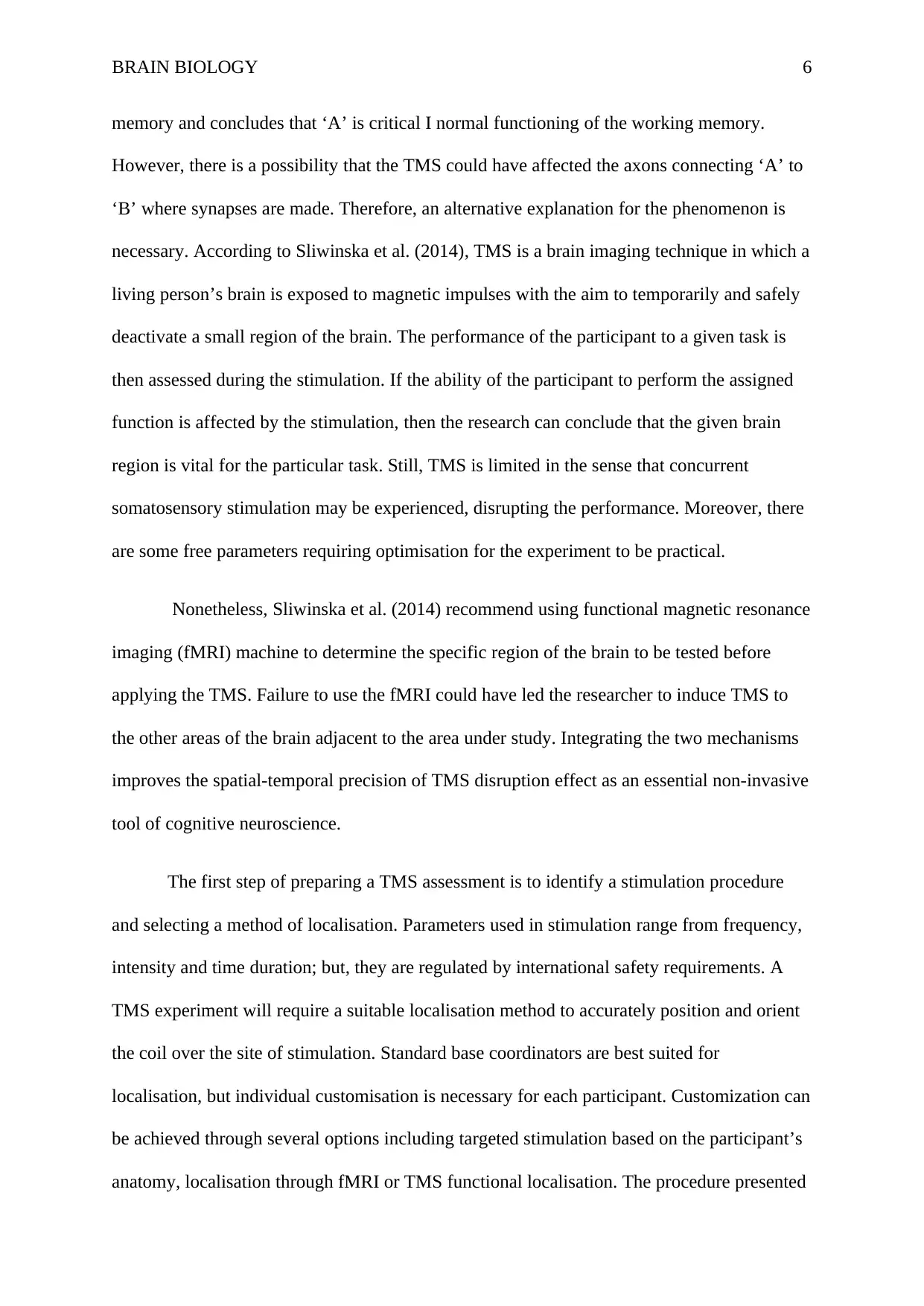
BRAIN BIOLOGY 6
memory and concludes that ‘A’ is critical I normal functioning of the working memory.
However, there is a possibility that the TMS could have affected the axons connecting ‘A’ to
‘B’ where synapses are made. Therefore, an alternative explanation for the phenomenon is
necessary. According to Sliwinska et al. (2014), TMS is a brain imaging technique in which a
living person’s brain is exposed to magnetic impulses with the aim to temporarily and safely
deactivate a small region of the brain. The performance of the participant to a given task is
then assessed during the stimulation. If the ability of the participant to perform the assigned
function is affected by the stimulation, then the research can conclude that the given brain
region is vital for the particular task. Still, TMS is limited in the sense that concurrent
somatosensory stimulation may be experienced, disrupting the performance. Moreover, there
are some free parameters requiring optimisation for the experiment to be practical.
Nonetheless, Sliwinska et al. (2014) recommend using functional magnetic resonance
imaging (fMRI) machine to determine the specific region of the brain to be tested before
applying the TMS. Failure to use the fMRI could have led the researcher to induce TMS to
the other areas of the brain adjacent to the area under study. Integrating the two mechanisms
improves the spatial-temporal precision of TMS disruption effect as an essential non-invasive
tool of cognitive neuroscience.
The first step of preparing a TMS assessment is to identify a stimulation procedure
and selecting a method of localisation. Parameters used in stimulation range from frequency,
intensity and time duration; but, they are regulated by international safety requirements. A
TMS experiment will require a suitable localisation method to accurately position and orient
the coil over the site of stimulation. Standard base coordinators are best suited for
localisation, but individual customisation is necessary for each participant. Customization can
be achieved through several options including targeted stimulation based on the participant’s
anatomy, localisation through fMRI or TMS functional localisation. The procedure presented
memory and concludes that ‘A’ is critical I normal functioning of the working memory.
However, there is a possibility that the TMS could have affected the axons connecting ‘A’ to
‘B’ where synapses are made. Therefore, an alternative explanation for the phenomenon is
necessary. According to Sliwinska et al. (2014), TMS is a brain imaging technique in which a
living person’s brain is exposed to magnetic impulses with the aim to temporarily and safely
deactivate a small region of the brain. The performance of the participant to a given task is
then assessed during the stimulation. If the ability of the participant to perform the assigned
function is affected by the stimulation, then the research can conclude that the given brain
region is vital for the particular task. Still, TMS is limited in the sense that concurrent
somatosensory stimulation may be experienced, disrupting the performance. Moreover, there
are some free parameters requiring optimisation for the experiment to be practical.
Nonetheless, Sliwinska et al. (2014) recommend using functional magnetic resonance
imaging (fMRI) machine to determine the specific region of the brain to be tested before
applying the TMS. Failure to use the fMRI could have led the researcher to induce TMS to
the other areas of the brain adjacent to the area under study. Integrating the two mechanisms
improves the spatial-temporal precision of TMS disruption effect as an essential non-invasive
tool of cognitive neuroscience.
The first step of preparing a TMS assessment is to identify a stimulation procedure
and selecting a method of localisation. Parameters used in stimulation range from frequency,
intensity and time duration; but, they are regulated by international safety requirements. A
TMS experiment will require a suitable localisation method to accurately position and orient
the coil over the site of stimulation. Standard base coordinators are best suited for
localisation, but individual customisation is necessary for each participant. Customization can
be achieved through several options including targeted stimulation based on the participant’s
anatomy, localisation through fMRI or TMS functional localisation. The procedure presented
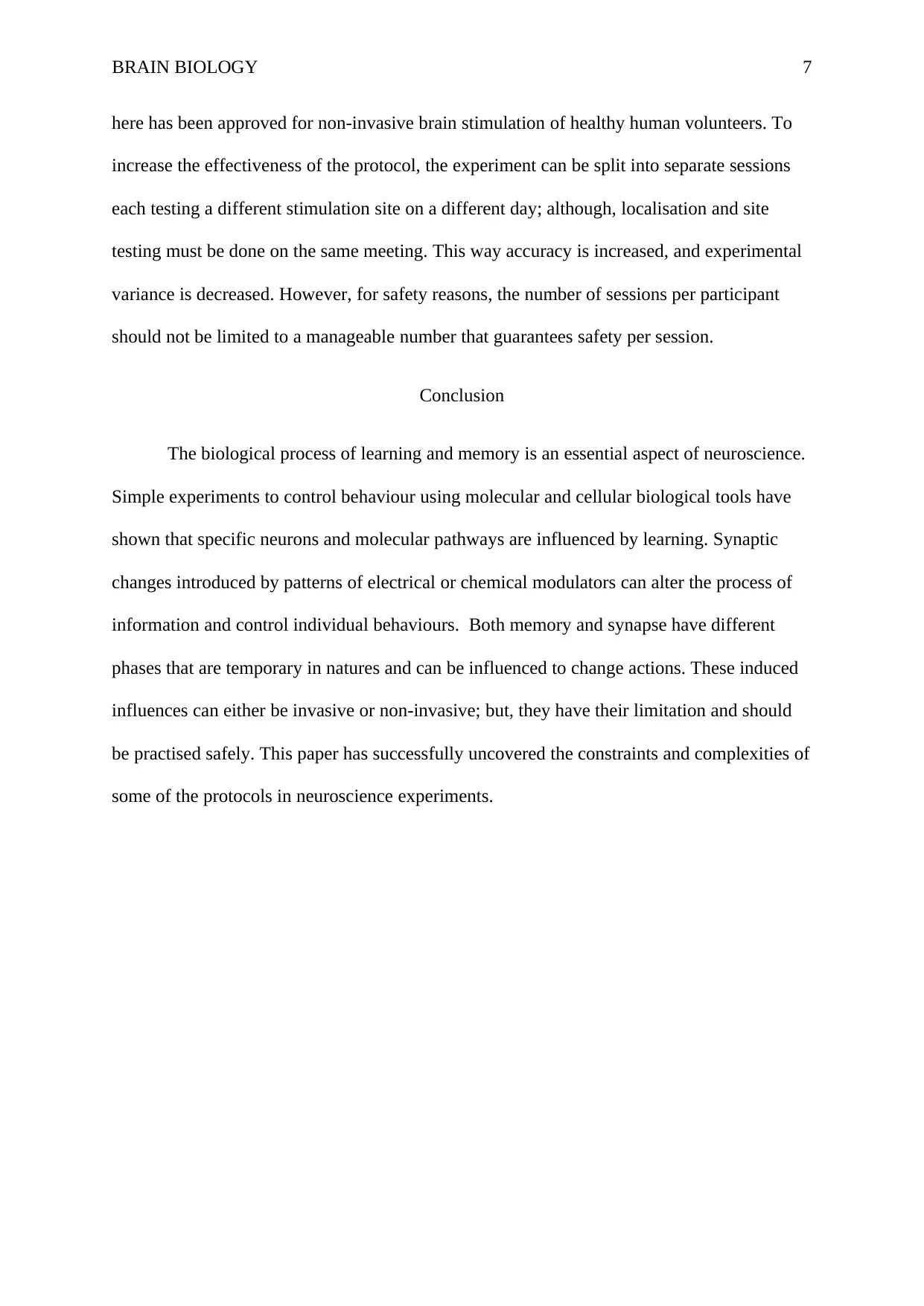
BRAIN BIOLOGY 7
here has been approved for non-invasive brain stimulation of healthy human volunteers. To
increase the effectiveness of the protocol, the experiment can be split into separate sessions
each testing a different stimulation site on a different day; although, localisation and site
testing must be done on the same meeting. This way accuracy is increased, and experimental
variance is decreased. However, for safety reasons, the number of sessions per participant
should not be limited to a manageable number that guarantees safety per session.
Conclusion
The biological process of learning and memory is an essential aspect of neuroscience.
Simple experiments to control behaviour using molecular and cellular biological tools have
shown that specific neurons and molecular pathways are influenced by learning. Synaptic
changes introduced by patterns of electrical or chemical modulators can alter the process of
information and control individual behaviours. Both memory and synapse have different
phases that are temporary in natures and can be influenced to change actions. These induced
influences can either be invasive or non-invasive; but, they have their limitation and should
be practised safely. This paper has successfully uncovered the constraints and complexities of
some of the protocols in neuroscience experiments.
here has been approved for non-invasive brain stimulation of healthy human volunteers. To
increase the effectiveness of the protocol, the experiment can be split into separate sessions
each testing a different stimulation site on a different day; although, localisation and site
testing must be done on the same meeting. This way accuracy is increased, and experimental
variance is decreased. However, for safety reasons, the number of sessions per participant
should not be limited to a manageable number that guarantees safety per session.
Conclusion
The biological process of learning and memory is an essential aspect of neuroscience.
Simple experiments to control behaviour using molecular and cellular biological tools have
shown that specific neurons and molecular pathways are influenced by learning. Synaptic
changes introduced by patterns of electrical or chemical modulators can alter the process of
information and control individual behaviours. Both memory and synapse have different
phases that are temporary in natures and can be influenced to change actions. These induced
influences can either be invasive or non-invasive; but, they have their limitation and should
be practised safely. This paper has successfully uncovered the constraints and complexities of
some of the protocols in neuroscience experiments.
Paraphrase This Document
Need a fresh take? Get an instant paraphrase of this document with our AI Paraphraser
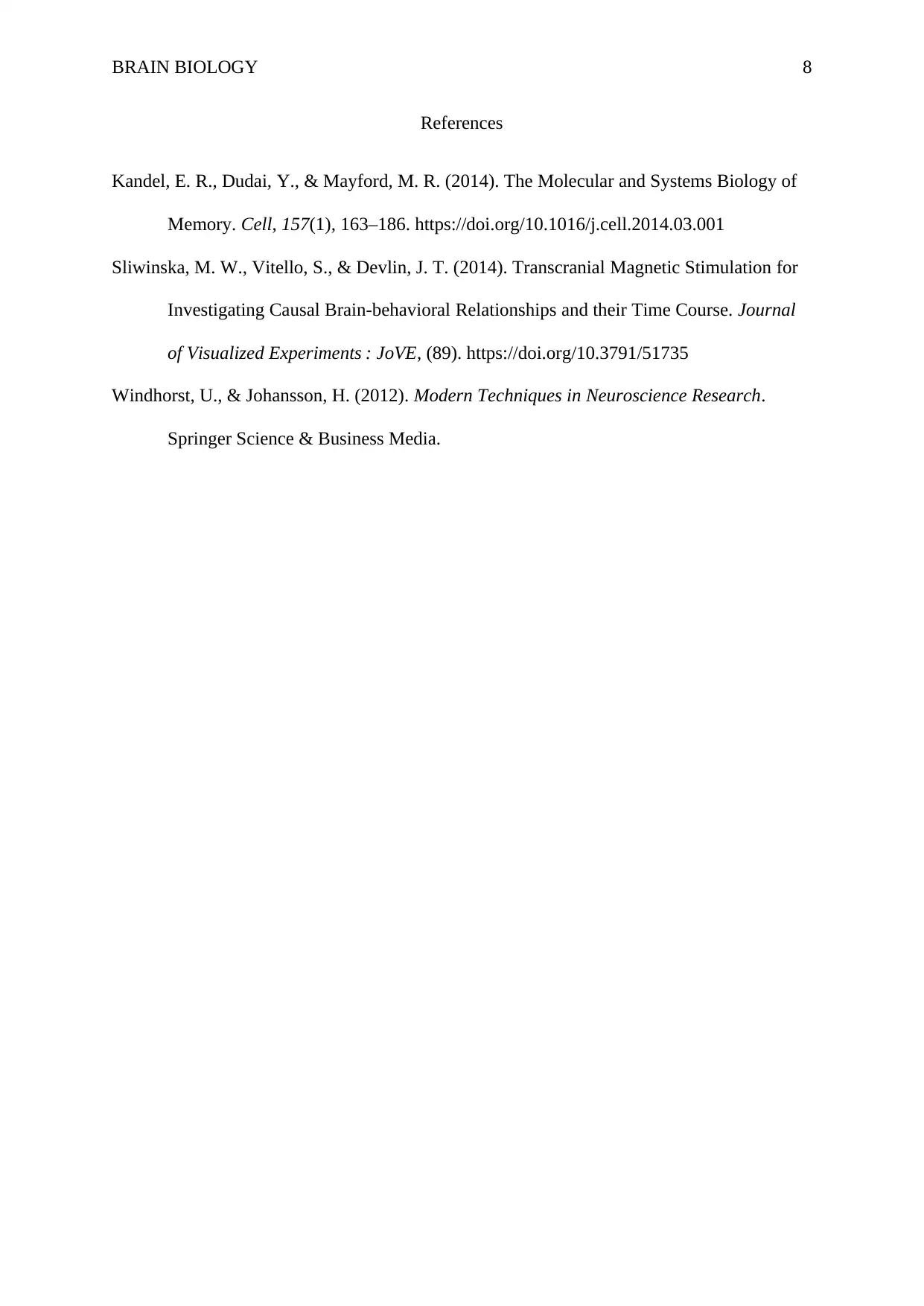
BRAIN BIOLOGY 8
References
Kandel, E. R., Dudai, Y., & Mayford, M. R. (2014). The Molecular and Systems Biology of
Memory. Cell, 157(1), 163–186. https://doi.org/10.1016/j.cell.2014.03.001
Sliwinska, M. W., Vitello, S., & Devlin, J. T. (2014). Transcranial Magnetic Stimulation for
Investigating Causal Brain-behavioral Relationships and their Time Course. Journal
of Visualized Experiments : JoVE, (89). https://doi.org/10.3791/51735
Windhorst, U., & Johansson, H. (2012). Modern Techniques in Neuroscience Research.
Springer Science & Business Media.
References
Kandel, E. R., Dudai, Y., & Mayford, M. R. (2014). The Molecular and Systems Biology of
Memory. Cell, 157(1), 163–186. https://doi.org/10.1016/j.cell.2014.03.001
Sliwinska, M. W., Vitello, S., & Devlin, J. T. (2014). Transcranial Magnetic Stimulation for
Investigating Causal Brain-behavioral Relationships and their Time Course. Journal
of Visualized Experiments : JoVE, (89). https://doi.org/10.3791/51735
Windhorst, U., & Johansson, H. (2012). Modern Techniques in Neuroscience Research.
Springer Science & Business Media.
1 out of 8
Your All-in-One AI-Powered Toolkit for Academic Success.
+13062052269
info@desklib.com
Available 24*7 on WhatsApp / Email
![[object Object]](/_next/static/media/star-bottom.7253800d.svg)
Unlock your academic potential
© 2024 | Zucol Services PVT LTD | All rights reserved.